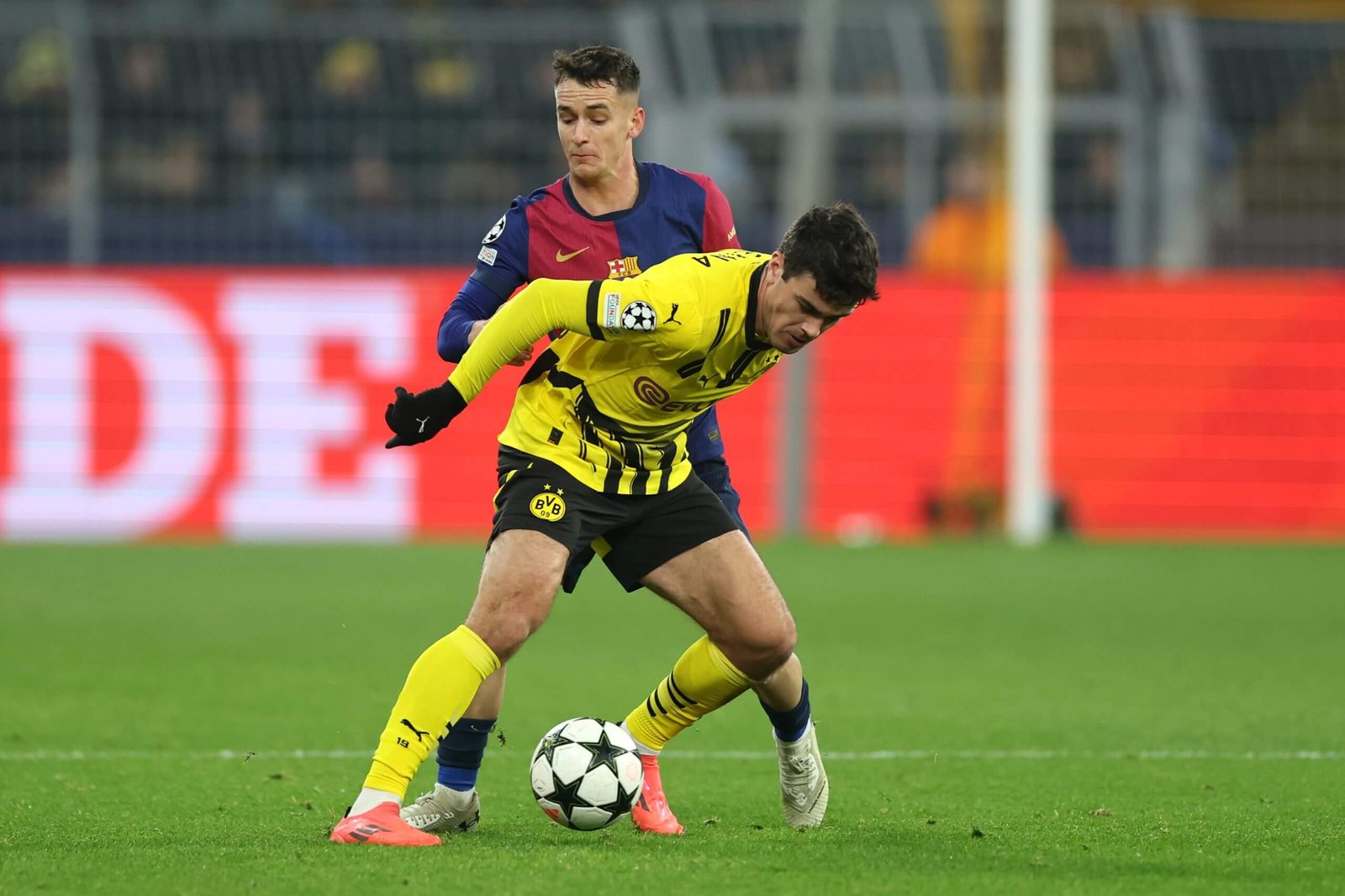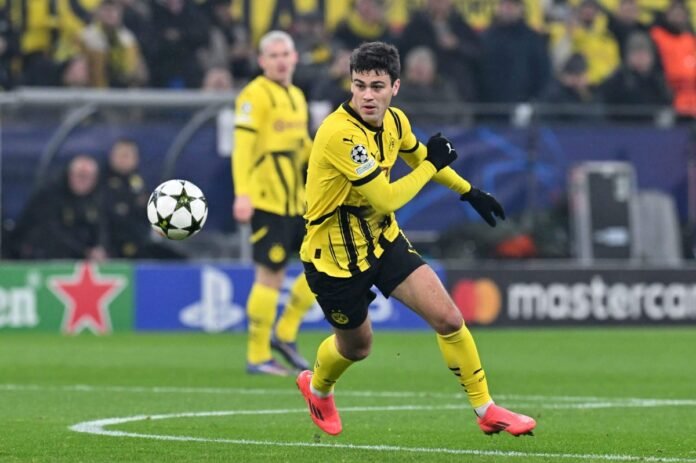In the minutes before Borussia Dortmund’s Champions League game against Barcelona began, a flare burned in the away end of the Westfalenstadion. It sent a cloud of smoke up and out over the pitch, where it hung in the freezing air. It was a perfect moment of framing for a big occasion. The stadium shook in anticipation, the referee held his whistle, and the haze drifted up and away into the night.
And when it did, 80,000 people witnessed something that none of them had expected to see: Giovanni Reyna on a football pitch, about to start a game for Dortmund.
It was an unexpected, but welcome sighting of a player who — somehow — is still only 22 years old. The evening may have ended in a 3-2 win for Barcelona, after a game full of goals and plot twists, but for the hosts Reyna felt like the dominant narrative.
This is a player around whom time has always seemed to move slightly differently. Perhaps that’s because in Europe Reyna does not attract attention or interest in the same way that he does in the United States. In the US he is a hope. Elsewhere, just another talent.
It means that when he does not play, for many people he ceases to exist. His reappearances then become little events of their own. Reminders of his ability, but also of how stymied his progress has been.
Giovanni Reyna settled after a slow start against Barcelona (Lars Baron/Getty Images)
There are many Dortmund fans who had probably given up on Reyna — not on his ability, but on the prospect of him developing fully at their club.
Not without cause: since the beginning of the 2021-22 season, Reyna has started only 17 games for Dortmund. He has appeared in 47 Bundesliga games in three and a half years and, prior to Barcelona, his last club start was November 1, 2023, in a German Cup game against Hoffenheim.
True, Reyna has started to appear more regularly from the bench over recent weeks — Dortmund have a host of injuries in attacking positions which has afforded him a chance — but prior to Wednesday night, his pitch time comprised just 67 minutes.
On Wednesday, he completed 72 before being replaced. Given that context and the quality of opposition, he played well. Dortmund initially looked bewitched by how well their opponents moved the ball and Reyna — like his teammates — seemed dizzied by the speed of the game. But he settled, piecing together a substantive performance with and without the ball.
Dortmund coach Nuri Sahin deployed him in the middle of his attacking midfield, behind Serhou Guirassy and between Jamie Gittens and Julen Duranville. His role was to disrupt the passing channels through the middle of the pitch and to help protect his own box. Against this Barcelona, who can be so slick and so often find angles that do not seem to exist, that can be a thankless task.
Reyna worked extremely hard in the face of it. A block here, a tackle there. Passing angles were seen and blocked off.
With the ball, he had his moments, too. An excellent switch of play in the first half pushed Ramy Bensebaini into space down the left Just before the half-time break, Reyna dug out an excellent cross to the back-post from which (a possibly offside) Guirassy should have done better.
Reyna was not a protagonist in the game, but nor was he a bystander either. When he left the pitch, it was to hearty applause from the home fans. It was recognition of his technical contribution, but also his physical struggle to be prominent within the game — and perhaps for relevance, certainly in terms of his club’s future.
And that is an interesting prospect. Ahead of the 2026 World Cup, Reyna will matter a great deal to Mauricio Pochettino’s USMNT. But it is harder to calculate his identity in Dortmund. Previously, he was just another player stamped with the BVB kitemark and destined to one day command a huge fee. But those days feel an age ago, even though he is still only 22. He’s like Dortmund’s lost boy.

Can Reyna stay in the Dortmund side now? (Lars Baron/Getty Images)
The irony of Reyna is that despite being so absent, his career at BVB encompasses so much. He has witnessed so many different moods and experiences. He has been coached by Lucien Favre, Marco Rose and Edin Terzic, as well as Sahin. He has played with Jadon Sancho, Axel Witsel and Achraf Hakimi, Jude Bellingham, Marco Reus and Erling Haaland.
In fact, it was a pass he gave that allowed Haaland to score that stadium-shattering goal against Paris Saint-Germain in the Champions League. Anybody who saw it can still remember Reyna in the aftermath, celebrating with Haaland as the stadium shook around and above them.
That was almost five years ago and so much has changed since — so much has happened just to the players involved in that game. To Neymar, to Kylian Mbappe, to Haaland, of course. To the respective clubs, too, and even, following the recent reforms, to the whole structure of the competition they were playing in that night. The whole feel of European football is different. The energy of the sport — after the Super League, the Qatar World Cup, and the coronavirus pandemic — has been altered forever.
Reyna is in many ways the odd one out. Controversy has swirled around him during that period — he has certainly experienced five years’ worth of melodrama during that time — but his career at club level has remained in a suspended animation.
But on Wednesday there was a shuffle forward. His performance did not earn him any exorbitant marks-out-of-10 or glowing praise. It was a fight for fitness and a search for muscle memory. But in the bars into which Dortmund fans flow on their way back into town, he would have been part of the conversation once more.
And while Dortmund lost, that feels like a victory for Reyna.
(Top photo: Bernd Thissen/picture alliance via Getty Images)
Read the full article here


